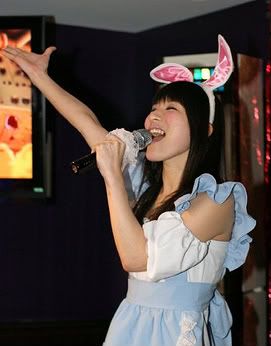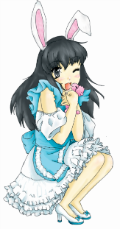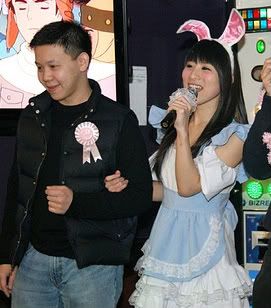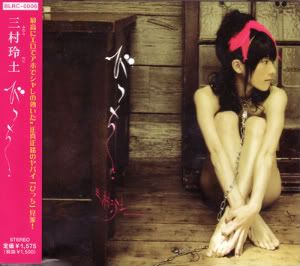Reni – The Japanese Idol of New York City
Japanese singer and dancer Reni Mimura makes her second local debut to a small concert that was mostly promoted by word-of-mouth. She is dressed in a frilly maid costume, carries around a pink stuffed poodle, and wears a pair of bunny ears on her head. Her set list is a combination of fan-requested anime theme songs, Reni’s self-picked cover songs, and her own original songs. Video screens around the venue show clips of the anime movie Nausicaä of the Valley of the Wind – a personal favorite of the singer – and the whole front section of the audience is filled with camcorders and digital cameras as the fans actively try to capture the concert on film.

While this setup might seem a little unusual for a small pop concert, it’s all because she’s singing in the Akihabara-style, which is famous for its connection to anime, anime fans, and a type of geek appeal described by the fans as moé. And because of their pretty faces, cute costumes, and non-threatening personalities, the moé Akihabara j-idols are to these nerdish otaku men what the Jonas Brothers are for American tween girls. That is why when Reni goes onto the stage, the small otaku audience gets onto their feet, applaud loudly, and then enthusiastically clap along as Reni sings her first anime theme song of the evening.
 But this isn’t Akihabara – it isn’t Japan – and most of the audience aren’t even Japanese. We’re in a small karaoke bar in the east side of New York City, which is being rented out the first Sunday of each month to serve as Reni’s personal venue. But for the American otaku in the audience, this is probably the closest they’ll ever get to seeing a cute j-idol perform like this.
But this isn’t Akihabara – it isn’t Japan – and most of the audience aren’t even Japanese. We’re in a small karaoke bar in the east side of New York City, which is being rented out the first Sunday of each month to serve as Reni’s personal venue. But for the American otaku in the audience, this is probably the closest they’ll ever get to seeing a cute j-idol perform like this.
Fortunately for them, this idol is now local, and she’s planning on sticking around in New York for quite some time.
So who exactly is Reni? Where did she come from and how did she end up in New York City?
I sat down for an interview with this singer in Bryant Park one Sunday while the nearby Kinokuniya bookstore held an “Anime Day” full of activities. But as an interviewer, it was very hard to get all the details. Like a proper J-idol, her personal life becomes overshadowed by a perky on-stage personality. So I tried my best to peel through the mystery to figure out the story behind this singer.
One thing is for certain, and that is that Reni is a genuine Japanese idol. Coming from the Yamaguchi Prefecture, she began taking dance lessons at the age of 7. “If I ask my parents why I ever got into dancing at such a young age, they would tell me that it was because I wouldn’t stop begging them to let me dance. So they enrolled me in a class just to shut me up,” she jokes.
But as she got older, she realized that she would need to do more for her career. “At that particular point in my life, it would be almost impossible to sell tickets and make a living if all I did was dance, so I had to take on new areas of entertainment.” She joined the Seinenza Theater Company in Tokyo where she studied the method and art of acting. During one stage production, a crew member suggested that the actors create their own music for the show, and they ended up forming a band out of this.
“That’s when I started singing,” she goes on, “We recorded a demo tape onto a MiniDisc and sent it out to producers and band contests.” In 2005, one contest selected Reni’s band out of 1,000 submissions to come in for a “Battle of the Bands” live performance. “I noticed that backstage and in the bathroom, I was the only one of the other seven singers still practicing up until the last minute,” she recalls. “I think that is what gave us the advantage.” Her band won the contest, and Reni got her first record deal because of it.
“Dance, J-pop, rock… we went with many types of music. We produced 10 different songs with the professional producer after winning the contest.” She released her first single, a gritty rock song called “Bitch”, in summer of 2006, and then began touring around Tokyo before finally settling into the otaku epicenter known as Akihabara.
The variety of Reni’s musical talents are evident in her karaoke bar concert as she picked different types of songs and switched up her vocal ranges for each one. After the cute and childish opening song, Reni goes in a much different direction by singing the theme song to “Cutie Honey” as perform by Kumi Koda. Reni’s sweet-as-sugar voice turns low and seductive, and her dancing imitates Koda’s sexy choreography. She also improvises a little when she strokes the curtains on the back of the stage with her fingertips.
Not particularly the most moé-like behavior for a j-idol to show, but the predominantly male audience didn’t seem to hold it against her.
But if her career has shown that she has the talent to do all types of music, what made her shed the sexy image and settle on the moé Akihabara style that she’s performing with now?
I think that the timing was just right for her to go moé. There was a bit of an Akihabara renaissance at the time because of the Densha Otoko phenomenon and the “Otaku Boom” that came of it. “At the time, we had open streets in Akiba, and that’s when the moé girls really started to shine.” It was a great opportunity for her to launch a career.
But Reni has a more philosophical take on it. “There’s a very nurturing healing power that comes with the Akihabara culture. I want to nurture the anime fans, and in return, I want to be nurtured by them. There’s a feeling of safety in it. I also feel that it’s a way for a woman to be a woman – all cutesy and dolled up – because that’s something that men cannot do.”
I think Reni really demonstrated this nurturing power around the midpoint of her karaoke bar concert. She played a game of Janken (“Rock-paper-scissors”) with the audience, which was a part of her act in Akihabara. The two winners of the game got to join her on stage, where she called them her “Heroes” and asked them to join her in singing the theme song to “My Neighbor Totoro.”
“Totoro, Totoro,” sings the one shy otaku to her left when Reni points the microphone towards him.
“Totoro, Totoro,” follows up the other shy otaku to her right.

Arm-in-arm with Reni, the two dudes looked completely petrified and ready to faint from all the attention. And yet the idol was able to subdue their nerves enough to get them to sing the silly children’s song. She even had one of them hold her pink poodle and blow bubbles for her.
While the actual details are unknown, Reni moved to New York City about eight months ago. “While the world is going through some tough times,” she explains, “I wanted to bring the nurturing healing powers of the Akihabara moé culture to America.” She intends to completely relaunch her career as a j-idol in New York, and to the best of her knowledge, she would be the first moé idol to be doing so outside of Japan. She did her first karaoke bar concert just two months ago.
So how exactly are the American otaku compared to the Japanese fans?
“Americans are much more… open about cosplaying and anime,” she politely answers and gestures to the activity on the other end of Bryant Park. “You’d never see something like that in Japan, we’re much more held back.” The cosplayers who were at the Kinokuniya event had left the store and were gathering at the park. They danced, yelled, goofed around… all the typical hyperactive behavior you’d see at an anime con. Yet Reni seemed fascinated to see these cosplaying fans doing this in a popular New York City park on a Sunday afternoon, and she’d watch them while I talked to her translator.
Reni and her management team are trying their best to get a grasp on the American fan community. Reni writes her own blog in Japanese, which her team then translate into English and post into an English-specific Blogspot account. She writes about anything, such as preparing for her next show, describing odd things she sees around the city, picking out her next costume, or declaring her love of Chinatown bread and ice cream on a warm day. She refers to her fans as “friends” and talks about “making friends” whenever she goes out to promote her next show. She even has a MySpace account where she streams a music video filmed in New York last month.
She can sing with a wide vocal range. She can dance different styles. She knows how to work a crowd. But on top of all of that, and probably what’s most important for a j-idol, Reni is also very easy on the eyes.

For our interview, I suggested she come in costume to promote her show at the Kinokuniya event. Reni clearly stood out among the densely pack crowd of fans and cosplayers in the store, and she turned many heads as people walked by. During our interview, a crowd of onlookers waited on the side to talk and take photos of her as soon as I was done with my questions. And many of my male friends, from a teenager to a much older “professional” man, turned towards me to get more info on her, particularly if she had a boyfriend or not… (>_>)
They all became clearly interested in Reni, and they haven’t even heard her sing a single note yet. Her appearance at Kinokuniya alone landed her a gig performing at the Japan Society’s KRAZY Cosplay Party this Saturday and the expressed interests from local convention runners for appearances during this summer’s convention season.
I can already tell that this moé appeal is going to make Reni a star among the local otaku community, maybe even beyond New York. We need a J-idol. It’s a niche that clearly exists, and Reni fills that niche perfectly. She just needs to be discovered by those potential fans who have yet to discover her. But once she gets them, they will stick around, as I’m sure that the fans who attended that karaoke bar concert with me in March will return for the next concert in April.
When Reni leaves the stage after her final song of her concert, the audience doesn’t even budge.”Moé! Moé! Moé!” An entire crowd of Americans in a bar in New York City, loudly chanting this Japanese word in unison like otaku in Akihabara. “Moé! Moé! Moé!”
But Reni doesn’t make us wait for long as she quickly comes out for her encore. “This song doesn’t really have any meaning for me,” she tells everyone in English. “I’m just going to sing it because I think it’s cute!” Then she goes into “Sakuranbo” by Ai Otsuka, and the crowd happily claps along to the cheery melody.
Reni – the cute, moé, cosplaying bunny-girl from Japan that somehow ended up in the streets of New York City. A genuine Japanese idol that American fans can finally call their own.
And it was about damn time we had one. (^_^)
For the latest information of Reni’s upcoming shows, please visit her English blog or her MySpace Page.
Thanks to Zlade for providing some photos and videos used in this article.
